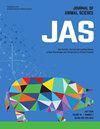玉米赤霉烯酮通过 AKT-mTOR-PPARγ-ACSL4 通路引发牛乳腺上皮细胞程序性细胞死亡并影响乳脂合成
IF 2.7
2区 农林科学
Q1 AGRICULTURE, DAIRY & ANIMAL SCIENCE
引用次数: 0
摘要
玉米赤霉烯酮(Zearalenone,ZEN)是一种来自镰刀菌的霉菌毒素,会损害雌性动物的生育能力和产奶量,但对其作用机制仍知之甚少。本研究以牛乳腺上皮细胞(MAC-T)为模型,研究了玉米赤霉烯酮对程序性细胞死亡(PCD)和乳脂合成的影响,并探讨了其潜在机制。我们发现,10 ng/mL催乳素(PRL)能显著增强MAC-T细胞的分化,促进乳脂、蛋白质和乳糖合成相关基因的表达。接着,测定了不同剂量的 ZEN 对经 PRL 处理的分化 MAC-T 的毒性效应。10 μM 和 20 μM ZEN 能显著降低细胞活力、诱导氧化应激和引发 PCD(如细胞凋亡和坏死)。值得注意的是,ZEN 暴露通过破坏 AKT-mTOR-PPARγ-ACSL4 通路,下调了参与乳脂合成的关键因子的 mRNA/蛋白质水平。有趣的是,以抗氧化性著称的褪黑素(MT)通过增强 PPARγ 与 ACSL4 启动子区域的结合,导致 ACSL4 基因表达上调,从而抵御了上述 ZEN 诱导的影响。这些结果凸显了MT减轻ZEN对乳腺细胞不利影响的潜力,为潜在的治疗干预提供了途径。本文章由计算机程序翻译,如有差异,请以英文原文为准。
Zearalenone Triggers Programmed Cell Death and Impairs Milk Fat Synthesis via the AKT-mTOR-PPARγ-ACSL4 Pathway in Bovine Mammary Epithelial Cells
Zearalenone (ZEN), a mycotoxin from Fusarium fungi, impairs fertility and milk production in female animals, however, the mechanisms remain poorly understood. Using the bovine mammary epithelial cells (MAC-T) as the model, this study investigated the impacts of ZEN on programmed cell death (PCD) and milk fat synthesis, and explored the underlying mechanism. We found that 10 ng/mL prolactin (PRL) notably enhanced the differentiation of MAC-T cells, promoting the expression of genes related to the synthesis of milk fat, protein, and lactose. Next, the toxic effects of different doses of ZEN on the differentiated MAC-T with PRL treatment were determined. 10 μM and 20 μM ZEN significantly reduced cell viability, induced oxidative stress, and triggered PCD (e.g. apoptosis and necrosis). Notably, ZEN exposure downregulated the mRNA/protein levels of critical factors involving in milk fat synthesis by disrupting the AKT-mTOR-PPARγ-ACSL4 pathway. Interestingly, melatonin (MT), known for its antioxidant properties, protected against the above ZEN-induced effects by enhancing the binding of PPARγ to the promoter regions of ACSL4, which led to the upregulated expression of ACSL4 gene. These results underscored the potential of MT to mitigate the adverse effects of ZEN on mammary cells, highlighting a way for potential therapeutic intervention.
求助全文
通过发布文献求助,成功后即可免费获取论文全文。
去求助
来源期刊

Journal of animal science
农林科学-奶制品与动物科学
CiteScore
4.80
自引率
12.10%
发文量
1589
审稿时长
3 months
期刊介绍:
The Journal of Animal Science (JAS) is the premier journal for animal science and serves as the leading source of new knowledge and perspective in this area. JAS publishes more than 500 fully reviewed research articles, invited reviews, technical notes, and letters to the editor each year.
Articles published in JAS encompass a broad range of research topics in animal production and fundamental aspects of genetics, nutrition, physiology, and preparation and utilization of animal products. Articles typically report research with beef cattle, companion animals, goats, horses, pigs, and sheep; however, studies involving other farm animals, aquatic and wildlife species, and laboratory animal species that address fundamental questions related to livestock and companion animal biology will be considered for publication.
 求助内容:
求助内容: 应助结果提醒方式:
应助结果提醒方式:


